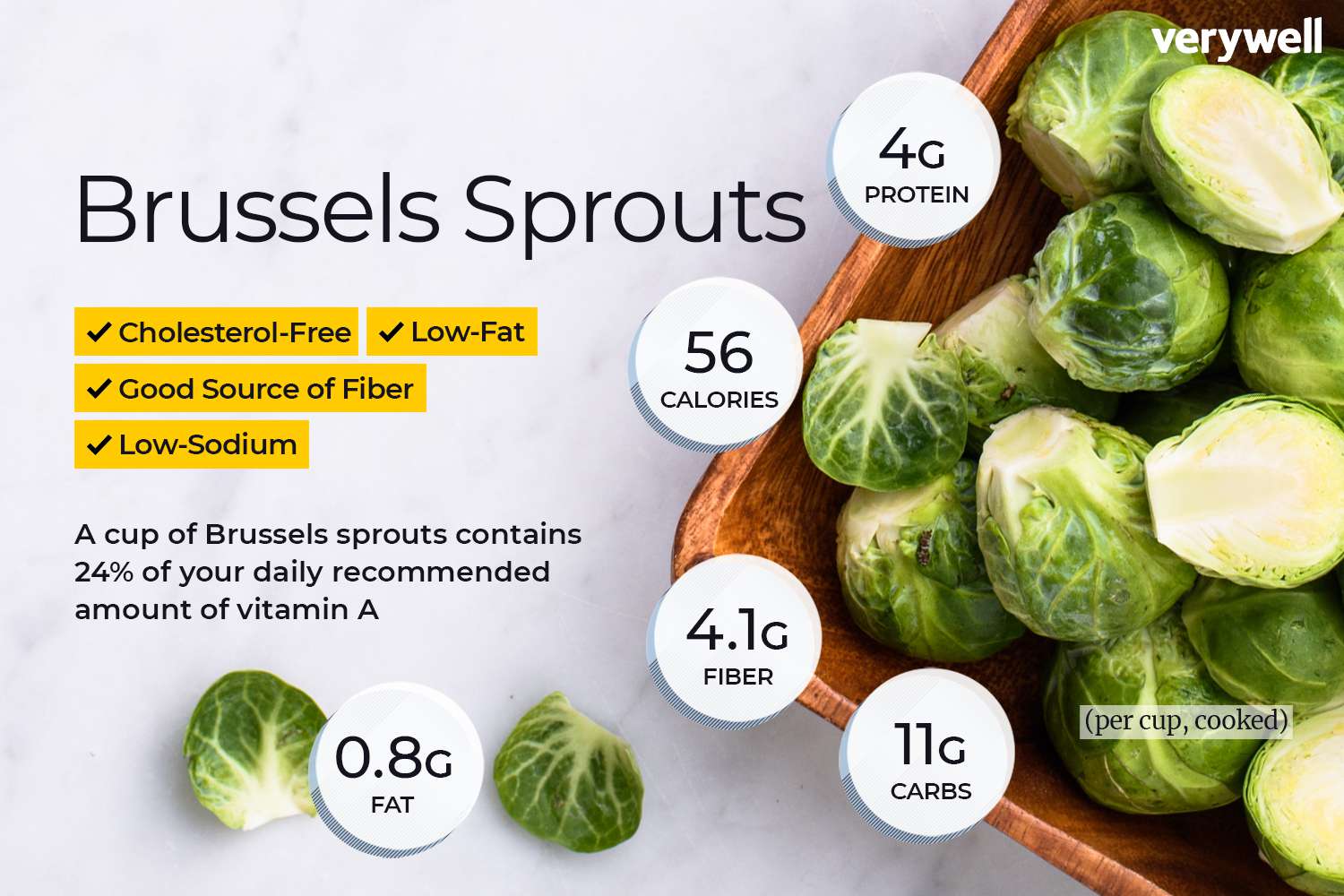Demystifying Carbs in Brussels Sprouts: A Comprehensive Guide
Brussels sprouts, those tiny green globes often met with mixed feelings, are gaining popularity in the world of nutrition. They’re not only delicious when prepared right but also pack a nutritional punch. In this comprehensive guide, we’ll delve into the carb content of Brussels sprouts and why it matters for your health.
What Are Brussels Sprouts?
Brussels sprouts, scientifically known as Brassica oleracea gemmifera, are miniature cabbage-like vegetables that belong to the Brassicaceae family. These bite-sized wonders have been a part of human cuisine for centuries, with their origins tracing back to ancient Rome.
Brussels Sprouts Nutritional Profile:
Now that we’re acquainted with Brussels sprouts let’s explore their nutritional makeup. These veggies are not just about carbs; they offer a wealth of essential nutrients. Here’s a snapshot of what you’ll find in a typical serving:
Carbohydrates:
Brussels sprouts are low in carbs, making them an ideal choice for those watching their carb intake. In a 1-cup (88-gram) serving, you’ll find only about 8 grams of carbs, with a significant portion being dietary fiber.
Fiber:
Fiber is a star component, with approximately 3.3 grams per serving. It’s crucial for digestive health, helping to regulate bowel movements and maintain a healthy gut.
Protein:
Surprisingly, Brussels sprouts contain a modest amount of protein, around 3 grams per serving. While they’re not a primary protein source, they contribute to your daily intake.
Vitamins:
Brussels sprouts are rich in vitamins, particularly vitamin K and vitamin C. A serving can provide over 100% of your daily vitamin K needs and nearly 80% of your daily vitamin C requirements.
Minerals:
These veggies also supply essential minerals like folate, potassium, and manganese.

Carbohydrates in Brussels Sprouts:
Now, let’s explore the carb content of Brussels sprouts in more detail. Carbs are a primary source of energy for our bodies, but not all carbs are created equal.
Types of Carbs:
Brussels sprouts contain two primary types of carbohydrates: dietary fiber and sugars.
Dietary Fiber:
The majority of the carb content in Brussels sprouts comes from dietary fiber. Fiber is essential for digestive health and helps regulate blood sugar levels. In a 1-cup serving of Brussels sprouts, you’ll get approximately 3.3 grams of fiber, a substantial contribution to your daily fiber needs.
Sugars:
While Brussels sprouts do contain some sugars, they are naturally occurring sugars and not added sugars. In a serving, you’ll find about 1.3 grams of sugars. These sugars come with the benefits of vitamins, minerals, and antioxidants found in Brussels sprouts.
How Carbs Impact Health:
Understanding how carbohydrates affect our health is crucial. Brussels sprouts, with their carb composition, offer several health benefits:
Steady Energy:
The fiber in Brussels sprouts provides a slow and steady release of energy, helping to maintain stable blood sugar levels. This can prevent energy crashes and overeating.
Digestive Health:
High fiber content supports healthy digestion, prevents constipation, and promotes a thriving gut microbiome.
Weight Management:
Brussels sprouts’ low-calorie and low-carb nature makes them a great addition to weight management plans. The fiber content promotes a feeling of fullness, reducing overall calorie intake.
Blood Sugar Control:
For those concerned about blood sugar, the fiber in Brussels sprouts can help regulate glucose levels, reducing the risk of insulin spikes.
Brussels Sprouts vs. Other Vegetables:
To put Brussels sprouts’ carb content into perspective, let’s compare them to other commonly consumed vegetables:
Broccoli:
While both are cruciferous vegetables, Brussels sprouts contain slightly more carbs than broccoli. However, the difference is minimal, and both are excellent choices for low-carb diets.
Cauliflower:
Cauliflower is another low-carb vegetable, often used as a substitute for high-carb foods. Brussels sprouts have a similar carb content, making them a viable alternative for variety.
Potatoes:
In contrast to Brussels sprouts, potatoes are starchy vegetables with a significantly higher carb content. Choosing Brussels sprouts over potatoes can be a smart move for those looking to reduce carb intake.
Cooking Brussels Sprouts to Preserve Carbs:
Cooking Brussels sprouts can be an art that not only enhances flavor but also retains their carb content. Here are some tips to ensure you’re getting the most out of these nutritious veggies:
Steaming:
Steaming Brussels sprouts preserves their nutrients, including carbs. Steamed sprouts remain crisp and delicious while keeping their low-carb status intact.
Roasting:
Roasting Brussels sprouts can bring out their natural sweetness. While some carbs may be lost during roasting, the rich flavor can make up for it.
Sautéing:
Sautéing Brussels sprouts in a healthy oil like olive oil can be a flavorful way to enjoy them. Just be mindful not to overcook, as prolonged heat can break down some of the carbs.
Recipes and Meal Ideas:
Let’s turn our attention to the culinary side of Brussels sprouts. Here are a couple of low-carb recipes and meal ideas that showcase the versatility of these mini cabbages:
Garlic Parmesan Brussels Sprouts:
Toss Brussels sprouts in minced garlic, olive oil, and grated Parmesan cheese. Roast them until tender and slightly crispy for a savory side dish.
Brussels Sprout Salad:
Shave Brussels sprouts thinly and mix them with a lemon vinaigrette, chopped almonds, and cranberries for a refreshing salad with a delightful crunch.
Brussels Sprouts and Bacon:
Sauté Brussels sprouts with crispy bacon bits for a mouthwatering combination that’s low in carbs and high in flavor.
Brussels Sprouts in Dietary Plans:
Now, let’s explore how Brussels sprouts align with popular dietary plans:
Keto Diet:
Brussels sprouts are keto-friendly due to their low carb and high fiber content. They make an excellent side dish for those following a ketogenic diet.
Low-Carb Diet:
If you’re watching your carb intake, Brussels sprouts are a fantastic choice. They provide essential nutrients without loading you up with carbs.
Vegan and Vegetarian Diets:
Brussels sprouts are a valuable addition to vegan and vegetarian diets. They offer plant-based protein and a wide array of nutrients.
Paleo Diet:
Brussels sprouts are in line with the principles of the paleo diet, which emphasizes whole, unprocessed foods. They are a great vegetable option for paleo enthusiasts.
Frequently Asked Questions (FAQs)
Are Brussels sprouts high in carbohydrates?
No, Brussels sprouts are relatively low in carbohydrates. In a 1-cup serving, they contain approximately 8 grams of carbs, with a significant portion being dietary fiber.
Can I eat Brussels sprouts on a keto diet?
Yes, Brussels sprouts are keto-friendly due to their low net carb content and high fiber, making them a nutritious addition to ketogenic meals.
Do Brussels sprouts contain sugar?
Yes, Brussels sprouts contain naturally occurring sugars. In a serving, you’ll find about 1.3 grams of sugars, which come with the benefits of vitamins, minerals, and antioxidants.
Are Brussels sprouts suitable for diabetics?
Yes, Brussels sprouts are a good choice for people with diabetes. Their high fiber content helps stabilize blood sugar levels.
How can I reduce the bitter taste of Brussels sprouts?
To minimize bitterness, choose smaller sprouts, trim the ends, and use cooking methods like roasting or sautéing.
What are the healthiest ways to cook Brussels sprouts?
The healthiest cooking methods for Brussels sprouts are steaming or roasting, as they retain most of their nutrients, including carbs.
Can Brussels sprouts cause gas or bloating?
Some individuals may experience gas after eating Brussels sprouts due to their fiber content. Cooking them thoroughly can help reduce this issue.
How do Brussels sprouts compare to broccoli in terms of carbs?
Brussels sprouts and broccoli have similar carb content. Both are excellent choices for low-carb diets.
Are Brussels sprouts suitable for a paleo diet?
Yes, Brussels sprouts align with the principles of the paleo diet, which emphasizes whole, unprocessed foods.
Can I include Brussels sprouts in a vegan or vegetarian diet?
Absolutely, Brussels sprouts are a valuable addition to vegan and vegetarian diets, providing plant-based protein and essential nutrients.
Conclusion:
In conclusion, Brussels sprouts are not only a delicious addition to your meals but also a nutritious choice for those concerned about carb intake. With their low-carb, high-fiber composition, they promote stable energy levels, digestive health, and weight management. Whether you’re following a keto, low-carb, or other dietary plan, Brussels sprouts can be a valuable asset to your nutrition.




